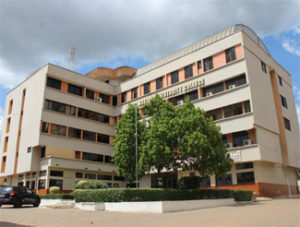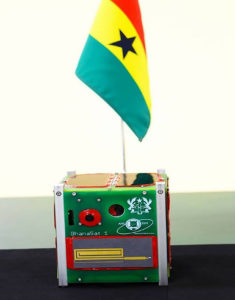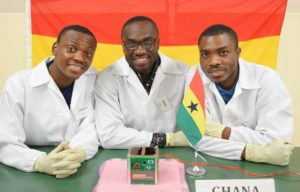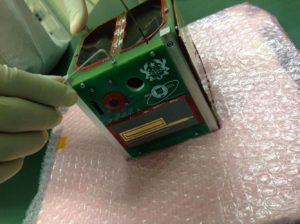Countries all over the African continent are emerging as potential space nations. Nigeria is already established in space. Ethiopia is set to build and launch a satellite and develop its own launch vehicle in the next five years. Sudan, Kenya, and Angola are all eager to set out their stalls in space too. But there is one nation in particular that catches the eye, and that is achieving some impressive – and very much indigenous – feats. That country is Ghana. SpaceWatch Middle East’s Editor-in-Chief Helen Jameson investigates.

In May this year, three graduates from Ghana’s All Nations University saw the launch of the cubesat that they built. GhanaSat-1 was launched by Nanoracks from the International Space Station’s (ISS) Japanese Kibo module. The thing that really stood out about this for me was the fact that this was not some multi-million dollar project undertaken by the national space agency. This was a satellite that was built in its entirety by Ghanaian graduates as part of a university project. I think this is an incredible story and that’s why I wanted to look a little more closely at it. Before we talk more about this incredible achievement, we should look at Ghana itself and its stance on the technology sector.
Ghana’s Tech Background
For Ghana, the information communications technology (ICT) sector is very important and is seen as an integral part of the country’s economy. In fact it is viewed as a means to advance the entire nation on a socio-economic level. The correlation between technology and development is one that has long been picked up on by the Ghanaian government and this very much includes space. The government has introduced its ‘Vision 2020’ plan which aims to make Ghana a well-developed country between 2020 and 2029. It is an emerging digital economy and the government is committed to transforming all sectors, using digital means, including healthcare, education, and the justice system. Ghana has already founded the Ghana Space Science and Technology Centre to explore the field of space.
Does Africa Need Space Programmes?

This willingness to push the space agenda is a source of criticism. Why does Ghana focus on space when there are many more pressing problems to address such as clean water, sanitation, and health? This is a debate that we hear time and time again and there are definitely solid arguments for and against. The facts are undeniable. In the latest United Nations Development Programme Human Development Report, issued in March 2017, Sub- Saharan Africa “remains burdened by the World’s most uneven distribution of development gains with women, girls, people in rural areas, migrants, refugees and those in conflict-affected areas systematically left behind.” It cites deep-rooted barriers to development with a lack of high-quality education which perpetuates poverty and a lack of Internet access which creates a barrier to education, livelihoods and political participation. Health standards are also in dire need of improvement with malnutrition widespread and preventable diseases prevalent.
Ghana itself has been ranked 139 out of 188 countries and territories in the report. Though it fares better than many other Sub-Saharan African countries, there are problems that are glaringly obvious, and therefore it is easy to see why there are many dissenting voices on the initiation of a Ghanaian space programme.
The other burning question is whether African countries receiving foreign aid should develop space programmes at all. Ghana is one of these countries, as is Ethiopia, Uganda, and Kenya, and others that are looking to move seriously into space. Should countries that cannot support themselves and their people financially (and where there is evidence of corruption) have their space programmes subsidised by foreign aid?
Ghana’s initial foray into space was CanSat, which we will shortly explore. This project had U.S.$50,000 investment from All Nations University – money that critics said should have been spent elsewhere. At the launch of CanSat, Samuel H. Donkor, President of All Nations University, was quoted by Associated Press: “They [the skeptics] think it is a pipedream, a waste of money.”
Also quoted on the CanSat launch by Associated Press, Prosper Kofi Ashilevi, director of the Ghana Space Science and Technology Centre, said: “Some wonder why we couldn’t concentrate on our problems of water, sanitation, health, all those things. I categorically disagree,” he said. “Space will help African countries who are very serious with it to leapfrog their development because it cuts across all sectors of the economy.”

The uneasiness and scepticism can be understood. After all, space and space technology, though fascinating to many, is not completely understood. Many people would not be able to tell you how a satellite can help with improvement in water quality, sanitation, healthcare, education, border protection, and a host of other critical applications. There is simply not the understanding out there of satellite technology and perhaps this is a crucial area to address so that the message can be pushed out about how satellites are key to actually solving these challenges and breaking down barriers to development.
CanSat to GhanaSat-1 – A Big Leap in Little Time
They say mighty oaks from little acorns grow. This is a phrase that could definitely be applied to Ghanasat-1. That’s because the journey began with a tiny satellite otherwise known as a deployable CanSat. A team of six students from All Nations University developed the CanSat, capable of taking imagery and other data. It was sent up into the air by a large balloon and reached the height of 165 metres. The original goal had been to reach 200 metres, but this height was enough to validate the technology. Once it reached its optimum height, the CanSat was brought back down to Earth with the aid of a parachute. It had been hoped that a small rocket would be used to launch the CanSat but, the team was not permitted to use one.
The group of six students that spent six months making the project happen were thrilled with the results. Inspired by the success of the CanSat project, three of those students; Benjamin Bonsu, Joseph Quansah, and Ernest Teye Matey, decided to take this achievement to another level. The project had caught the imagination of people across the entire country and the CanSat experiment was followed eagerly by Ghanaians and others across the world. This was a sign that Ghana was truly serious about making headway in space – and more importantly, it had the talent in-country to achieve it. For a small country, this was big news. And it was about to become much bigger.

In 2015, the opportunity arose for the three students to participate in the Joint Multi-National Birds Satellite Project which is a cross-border interdisciplinary satellite project for non-spacefaring countries supported by Japan and the Kyushu Institute of Technology (KIT). The project ran over two years and students designed, developed, and tested their CubeSat projects. The result of the Birds project was GhanaSat-1, which was completed in December 2016. This was a triumph for the team and for Ghana, especially as experts had speculated at the time of the CanSat project, that Ghana was, “at least 5 years from developing a functioning satellite.” [Source: The Telegraph].
GhanaSat-1 weighs 1kg and is the first ever Ghanaian satellite. It is equipped with high and low resolution cameras and sensors that will enable it to monitor Ghana’s coastline. The satellite will also investigate the effect that radiation and the space environment has on microprocessors. There is also another fundamental purpose to the GhanaSat-1 programme, and that is to inspire STEM education in high schools across the country where GhanaSat-1 will be used to integrate satellite and space technology into the high school curriculum.
For a small country, Ghana is making very big progress. It has become a space faring nation in its own right and yet has achieved this through its own, indigenous ingenuity with collaboration from KIT and the Birds project. For Ghanaians, what has been achieved by three young graduates from All Nations University is a source of immense national pride. It has truly struck a chord, especially with young people. Yes, Ghana faces its own very real challenges, but at the same time, though costly, space is a critical part of the solution to these challenges and is an area that is truly worth investing in.
Ghana is a forward-thinking country and this is reflected in the commitment it has shown to development of its infrastructure to enable better connectivity across the country. The move to integrate space technology into the school curriculum will ignite interest in space in the next generation of Ghanaian engineers and scientists. Ghanasat-2 is already on the drawing board, and following the huge success of the GhanaSat-1 mission, the government has agreed to subsidise the next satellite programme.
It is easy to criticise African nations that are developing space programmes, but the important point to note is that space will help to address these challenges. A sustainable space programme will actually enable a country to address its challenges. We are not talking about deep space missions to explore new planets but a small satellite programme that will deliver useful, tangible benefits. This fact is misunderstood by many. The impact of space is not restricted to just one sector of the country or economy – it embraces everything and it can facilitate great change for Ghana.
From CanSat very swiftly to GhanaSat-1, the potential for Ghana in space is enormous and the country will serve as an inspiration for other African nations wishing to make space a destination for themselves.
Helen Jameson is Editor-in-Chief of SpaceWatch Middle East.
Original published at: https://www.spacewatchme.com/2017/11/spacewatchme-oped-ghana-satellite-programme-the-space-race-is-on
 SpaceWatch.Global An independent perspective on space
SpaceWatch.Global An independent perspective on space

